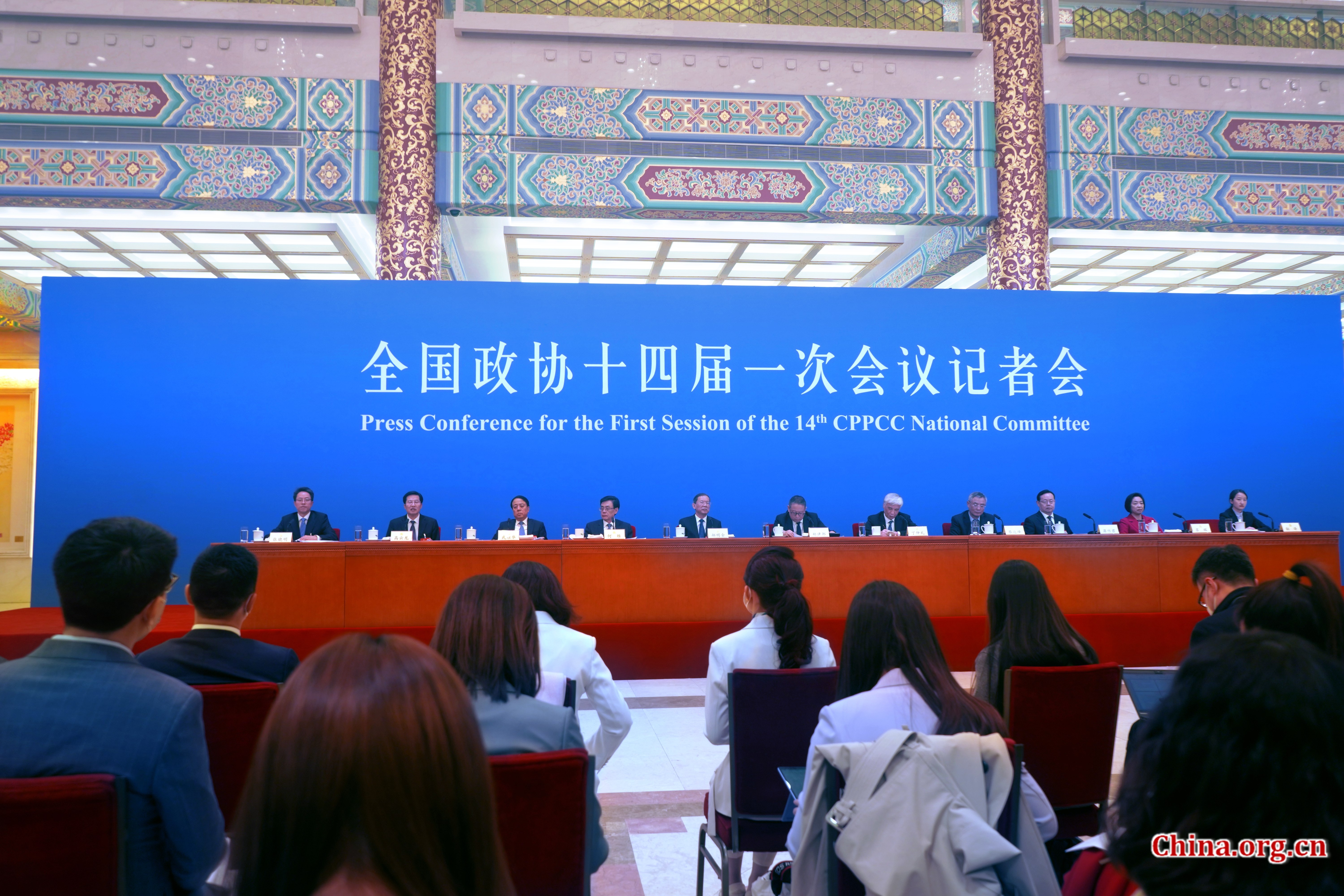China's non-Communist parties share participation in state affairs
- By Cui Can
 0 Comment(s)
0 Comment(s) Print
Print E-mail China.org.cn, March 6, 2023
E-mail China.org.cn, March 6, 2023

Heads of the central committees of the non-Communist political parties and the All-China Federation of Industry and Commerce take questions at a press conference during the first session of the 14th National Committee of the Chinese People's Political Consultative Conference in Beijing, March 5, 2023. [Photo by Cui Can/China.org.cn]
Leaders of China's eight non-Communist parties and the chairperson of the All-China Federation of Industry and Commerce met the press and shared the highlights of their participation in China's system of multiparty cooperation and political consultation at a press conference in Beijing on Sunday.
Many foreigners may know that the Communist Party of China (CPC) holds power in China, but less well-known perhaps is that the country also has eight other political parties. The press conference provided the world with a glimpse into China's unique political system.
Stressing CPC leadership
"'Following the CPC is the only way to walk on the right path' is a political belief that the old generation of leaders of the China Association for Promoting Democracy (CAPD) has followed throughout their lives," said Cai Dafeng, chairman of the Central Committee of the CAPD, adding that it is necessary for the CAPD to pass on their political belief and work to better serve the big-picture interests.
In response to major strategic decisions of the CPC, the non-Communist parties have played a crucial role in leveraging their strength to meet the needs of the country.
Wu Weihua, chairman of the Central Committee of the Jiusan Society, said that the Jiusan Society has always been committed to building China's strength in science and technology.
Since 2018, the party has conducted extensive research into many enterprises, finding that some lacked sufficient R&D motivation and investment. One of the reasons behind this is that although the policy of granting additional tax deductions for R&D costs helped to boost enterprises' R&D investment, problems such as limited coverage and a low deduction rate still remained, Wu said.
The Jiusan Society then submitted proposals to the National Committee of the Chinese People's Political Consultative Conference on strengthening guidance for the R&D expense deduction policy to encourage enterprises to conduct basic and applied research, offering useful references for improving relevant policies.
According to this year's government work report, over the past five years, China has raised the extra tax deduction on R&D expenses for manufacturing firms and small and medium-sized sci-tech enterprises from 50% and 75%, respectively, to 100%, and the policy has been extended to cover all qualified industries.
Serving interests of all
One of China's eight non-Communist parties, the Chinese Peasants and Workers Democratic Party (CPWDP) mainly consists of intellectuals working in the fields of health care, education, science and technology.
The entire party has worked together in the battles against poverty and the epidemic over recent years, making great contributions and demonstrating the party's political character of serving the country and improving people's well-being, said He Wei, chairman of the CPWDP.
According to He, nearly 30,000 CPWDP members served as medical workers on the front line against the epidemic. By the end of last year, more than 60,000 party members had donated a total of 1.23 billion yuan ($178 million) in the form of money or materials.
This year marks the 70th anniversary of the founding of the All-China Federation of Industry and Commerce (ACFIC). Gao Yunlong, chairman of the ACFIC, said that since its founding, the federation has served as a bridge and a link between the CPC and the government, and private enterprises.
By carrying out such initiatives as "mobilizing over 10,000 private enterprises to engage in poverty alleviation in more than 10,000 villages," the ACFIC has encouraged private enterprises to make significant contributions to socio-economic development, creating jobs and improving people's livelihoods, Gao said.
New type of party system
"Since the People's Republic of China was founded over 70 years ago, China has maintained long-term stability and sustainable economic development, in which the new type of party system has played a significant role," said Zheng Jianbang, chairman of the Central Committee of the Revolutionary Committee of the Chinese Kuomintang (RCCK).
China's political party system is different from the pluralist party system common in the West, and the one-party system, as it allows the ruling party and participating parties to work jointly for the nation, Zheng said.
By actively participating in political consultation, the deliberation of state affairs and democratic oversight, members of non-Communist parties contribute their strength and wisdom to addressing the public's major concerns.
Ding Zhongli, chairman of the Central Committee of the China Democratic League (CDL), said at the press conference that since 2021, the CDL has conducted special democratic oversight over the ecological conservation of the Yangtze River in Yunnan province. Targeting problems they identified during their oversight and supervision work, the CDL has offered suggestions and organized experts in environmental protection to assist local governments.
"The Party committees and governments at all levels have attached great importance to the democratic oversight work of the non-Communist parties," Ding said, adding that democratic oversight has been implemented in earnest and achieved great progress.






Go to Forum >>0 Comment(s)